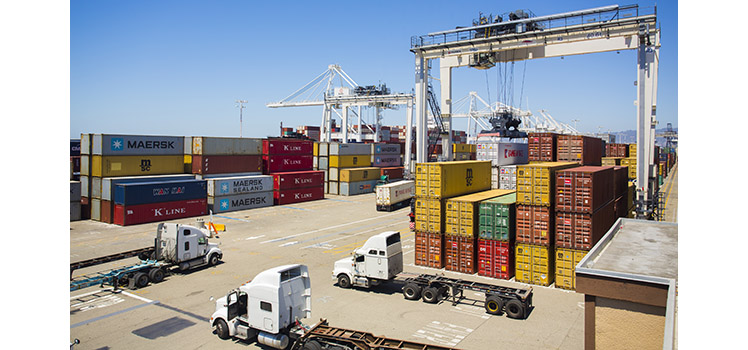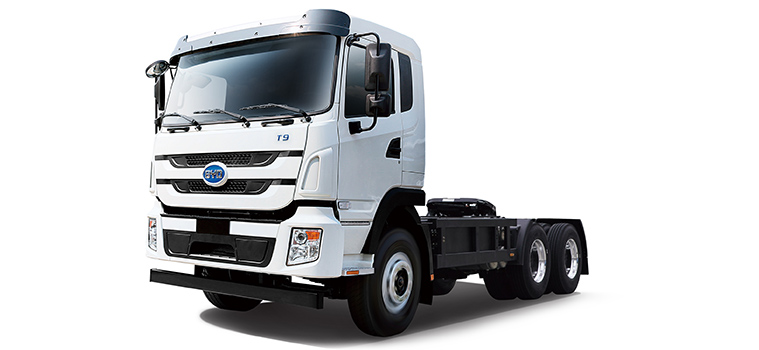Port of Oakland-based trucking operator GSC Logistics will receive a battery-powered semi later this month to help the State of California gauge the feasibility of using zero-emission trucks for hauling freight.

The purpose of the study is to figure out whether zero-emission trucks could replace diesel trucks. Over five million commercial trucks of varying sizes are registered in the State of California. Photo courtesy of the Port of Oakland
BY BILL PICTURE
Published: September, 2017
Port of Oakland-based trucking operator GSC Logistics will receive a battery-powered semi later this month to help the State of California gauge the feasibility of using zero-emission trucks for hauling freight.
The truck is one of six being loaned to drayage companies in California by Chinese manufacturer BYD Company as part of a three-year study initiated by the California Air Resources Board (CARB). The other five trucks are being tested concurrently by cargo companies operating at ports in Southern California.
“CARB has been talking to BYD about the study for about two years now, I think,” said GSC Logistics CEO Scott Taylor. “They approached us several months ago because we have a large presence at the Port of Oakland. We knew that zero-emission technology was in the process of being adapted for this kind of use, so we were really excited they invited us to take part in the study. It’s a potential game-changer, I’d say.”
The purpose of the study is simple and obvious—figuring out whether zero-emission trucks could replace diesel trucks someday. Over five million commercial trucks of varying sizes are registered in the State of California, according to the California Department of Motor Vehicles. Together, these trucks carry just under four million tons of cargo each day.
“We’re out to prove that zero-emission, battery-powered trucks can be used in heavy-duty applications,” said Andy Swanton of BYD in a written statement.
In addition to significantly improving air quality by omitting freight trucks from the pollution equation, Swanton expects electric trucks will lower operating costs for companies like GSC, as well as reduce noise levels along busy trucking routes, as loud diesel engines are replaced by the nearly inaudible hum of electric trucks. “That would be amazing, but I think we’re still a ways off from that happening,” Taylor said. “The technology isn’t quite there yet.”
BYD’s battery-powered truck currently has a range of only 100 miles, a fraction of the distance that most cargo must travel between Point A and Point B. But Taylor said that’s sufficient for short hauls. Taylor also plans to sub in the electric loaner from BYD for one of the GSC-owned trucks currently used to transport containers between marine terminals at the Port of Oakland and nearby yards in San Leandro and Hayward. GSC operates five short-haul trucks of its own, in addition to managing 200 owner-operated trucks each day. GSC hauls the equivalent of about 100,000 twenty-foot containers of cargo across Northern California and Nevada each year. It is the largest motor carrier at the port.
“This is just phase one of the study,” Taylor said, “and the goal of phase one is to gather as much data as possible about the truck’s operational efficiencies, productivity, reliability and maintenance factors.”
Taylor said he’s particularly interested to see how fuel savings will stack up against maintenance costs over the course of the three-year study. “I’ve heard some owners of electric cars and hybrids complain that repair costs can be really expensive, so we’ll be looking at that, of course,” he said. “The environmental benefits are just one of a number of factors that have to be considered. In the end, the electric trucks have to make sense financially as well for operators.”
When BYD delivers the trucks in a few weeks, each will be outfitted with a host of onboard devices that will track the truck’s every move and record data for CARB to review. If all goes well, Taylor said he’d definitely consider replacing more of GSC’s short-haul rigs with electric trucks. And he hopes zero-emission technology will continue to be developed so that electric trucks can eventually be used for longer hauls as well.
In the meantime, Taylor said many of GSC’s customers see the zero-emission trucks as another green feather in their caps, mirroring their own attempts to green their operations from the top down. “More and more consumers want to spend their money with companies that operate sustainably, and CEOs are responding by sending a message down the operations chain to clean up their companies,” said Taylor. “When our customers found out about the study, some reached out to us and said, ‘When the truck gets here, can you use it for our loads?’ They were really excited about it.”
The Port of Oakland is excited about the study because it aligns with the port’s ongoing efforts to reduce greenhouse gas emissions. Those efforts have resulted in a 98 percent reduction in diesel particulate emissions by trucks servicing the port over the last decade.
Among many other initiatives, the port has subsidized clean-truck purchases and has shrunk the queues at its gate in order to reduce idling times, noted Port of Oakland Environmental Programs and Planning Director Richard Sinkoff in a written statement. “Battery-powered trucks are a logical next step for exploration,” he added.

Manufacturer BYD wants to prove that zero-emission, battery-powered trucks can be used in heavy-duty applications. The current range of their battery-powered truck is 100 miles.

